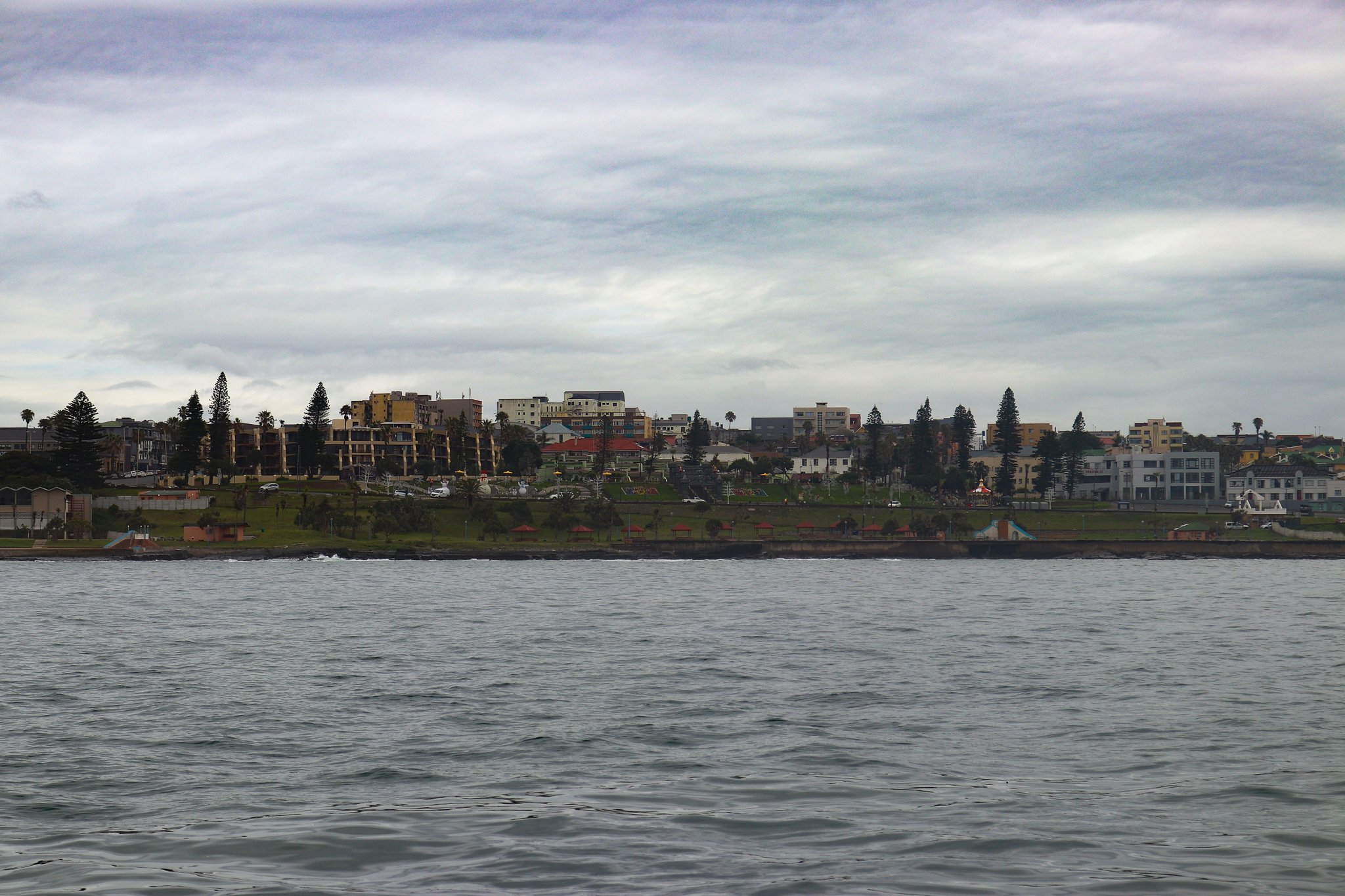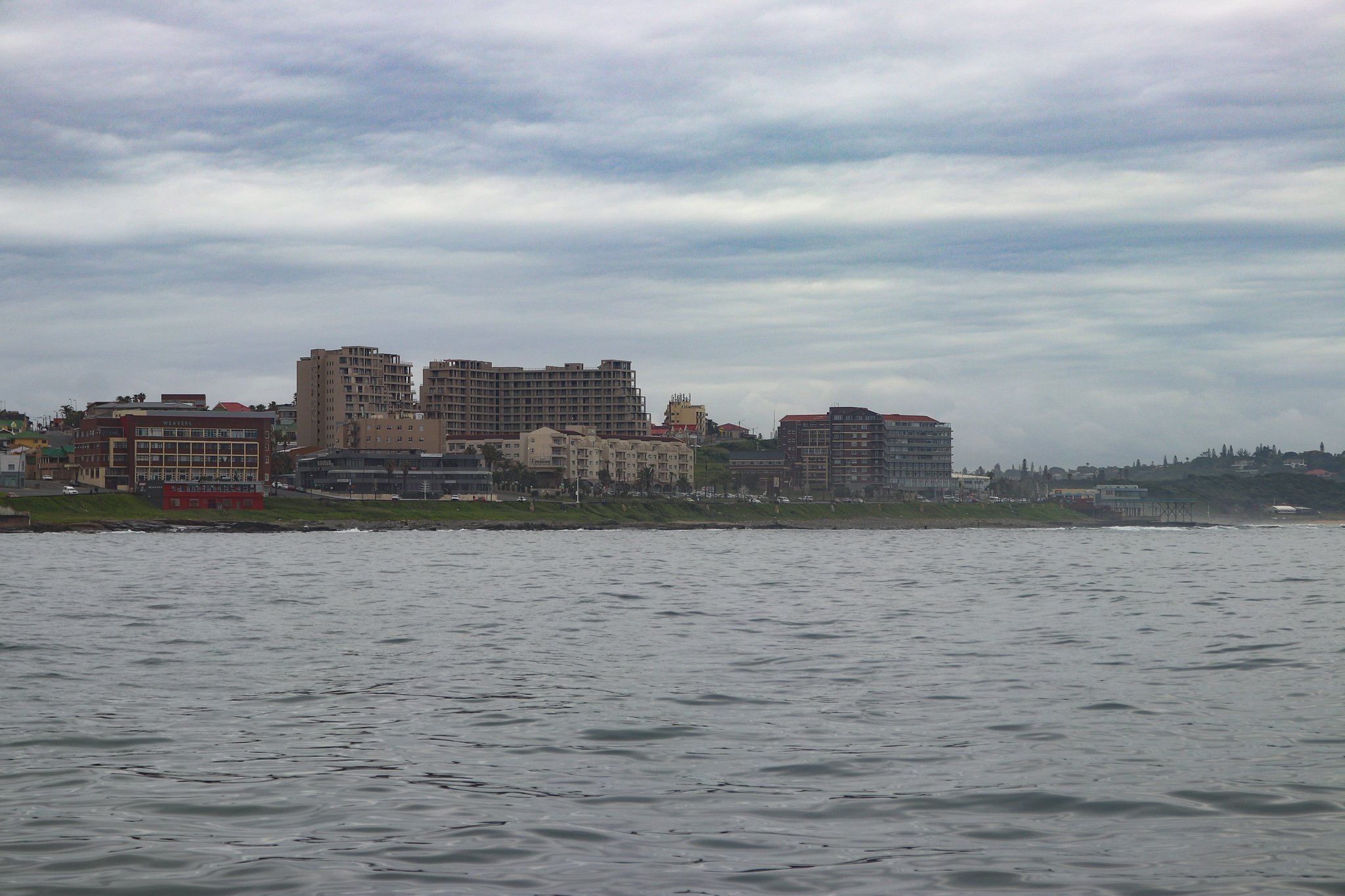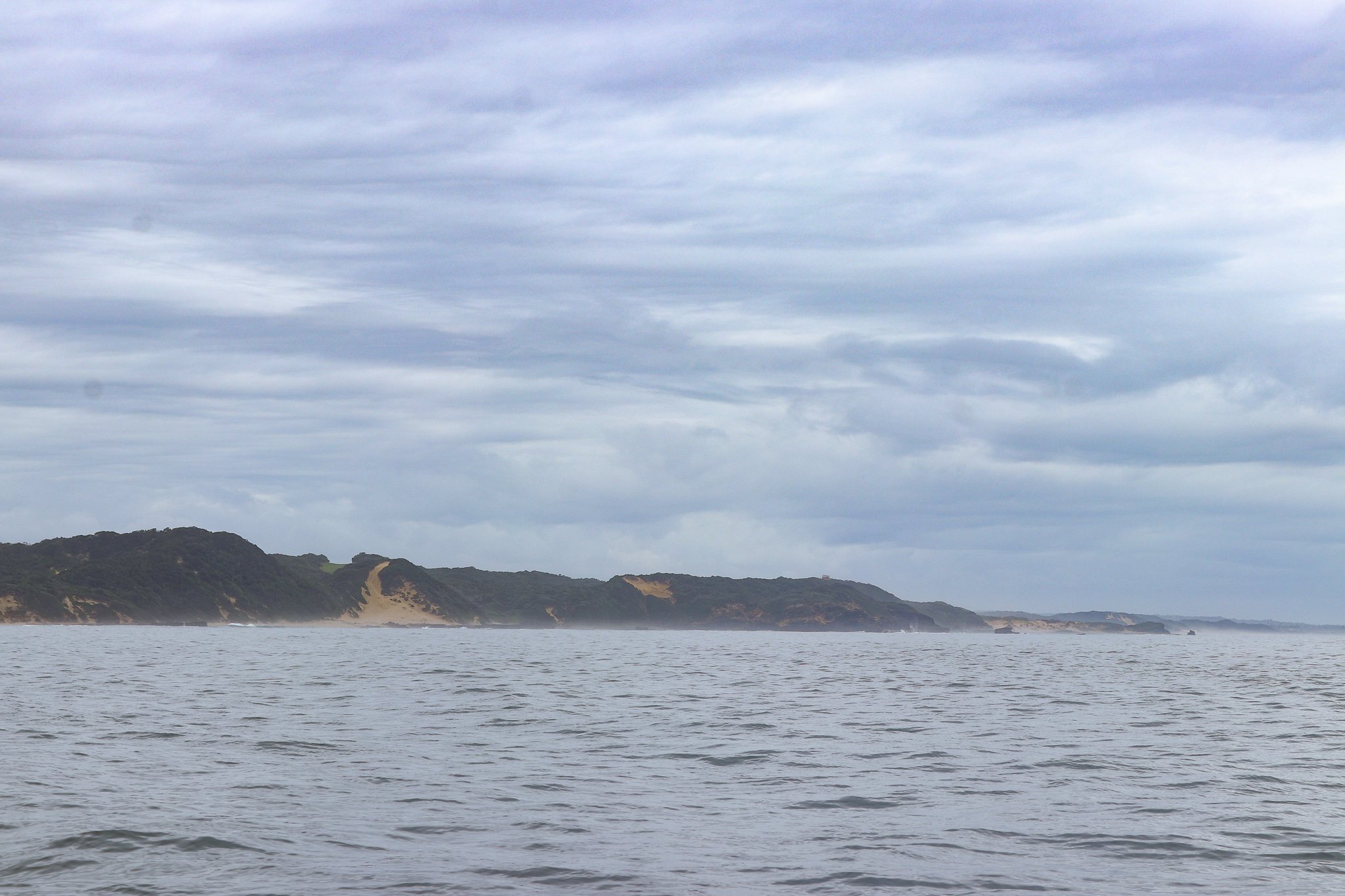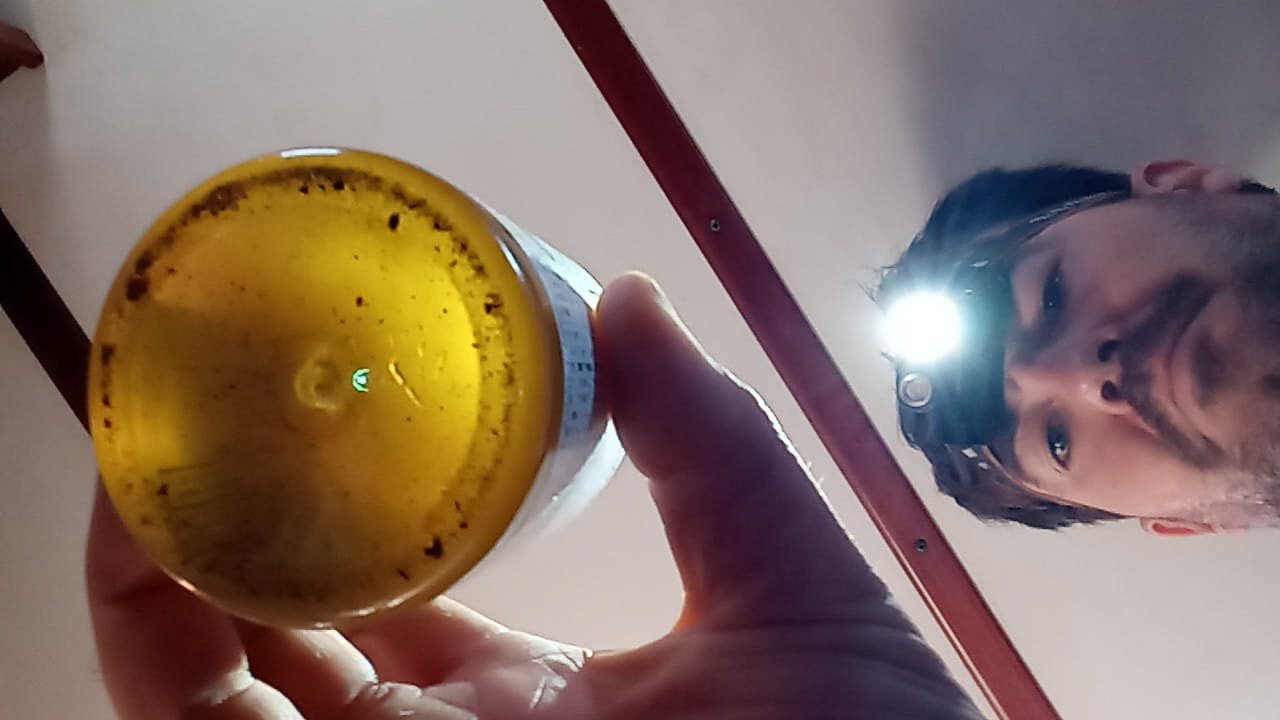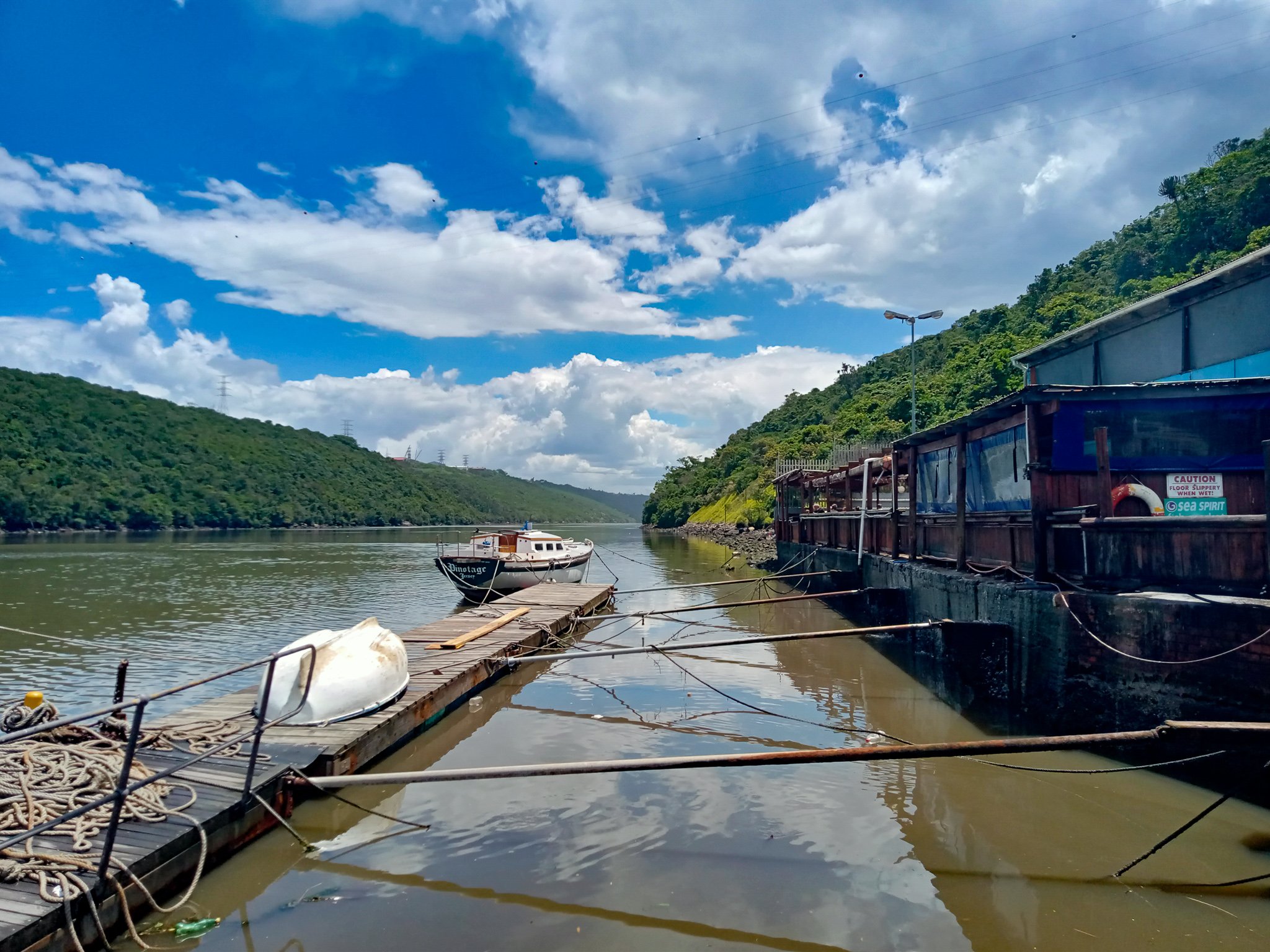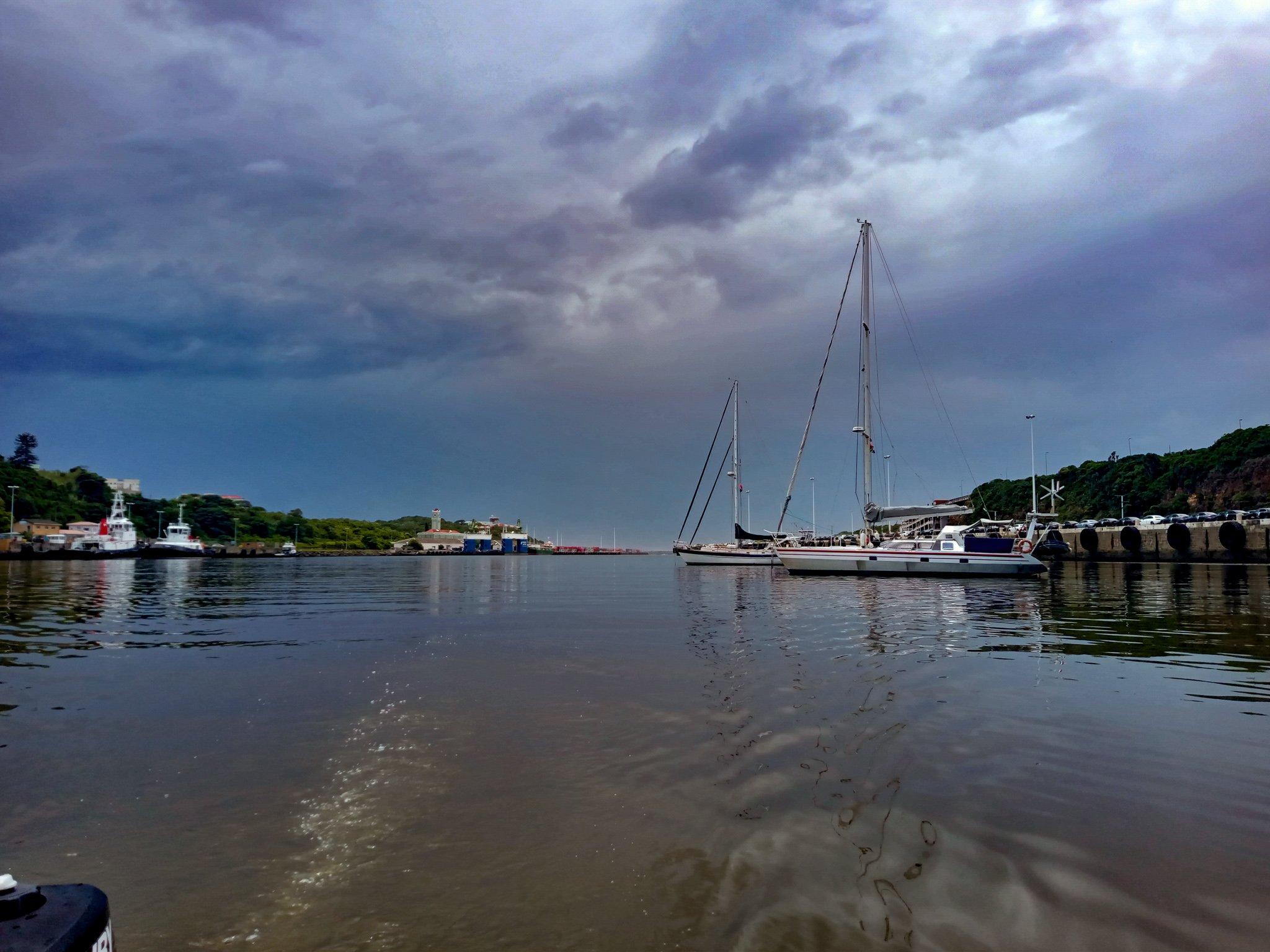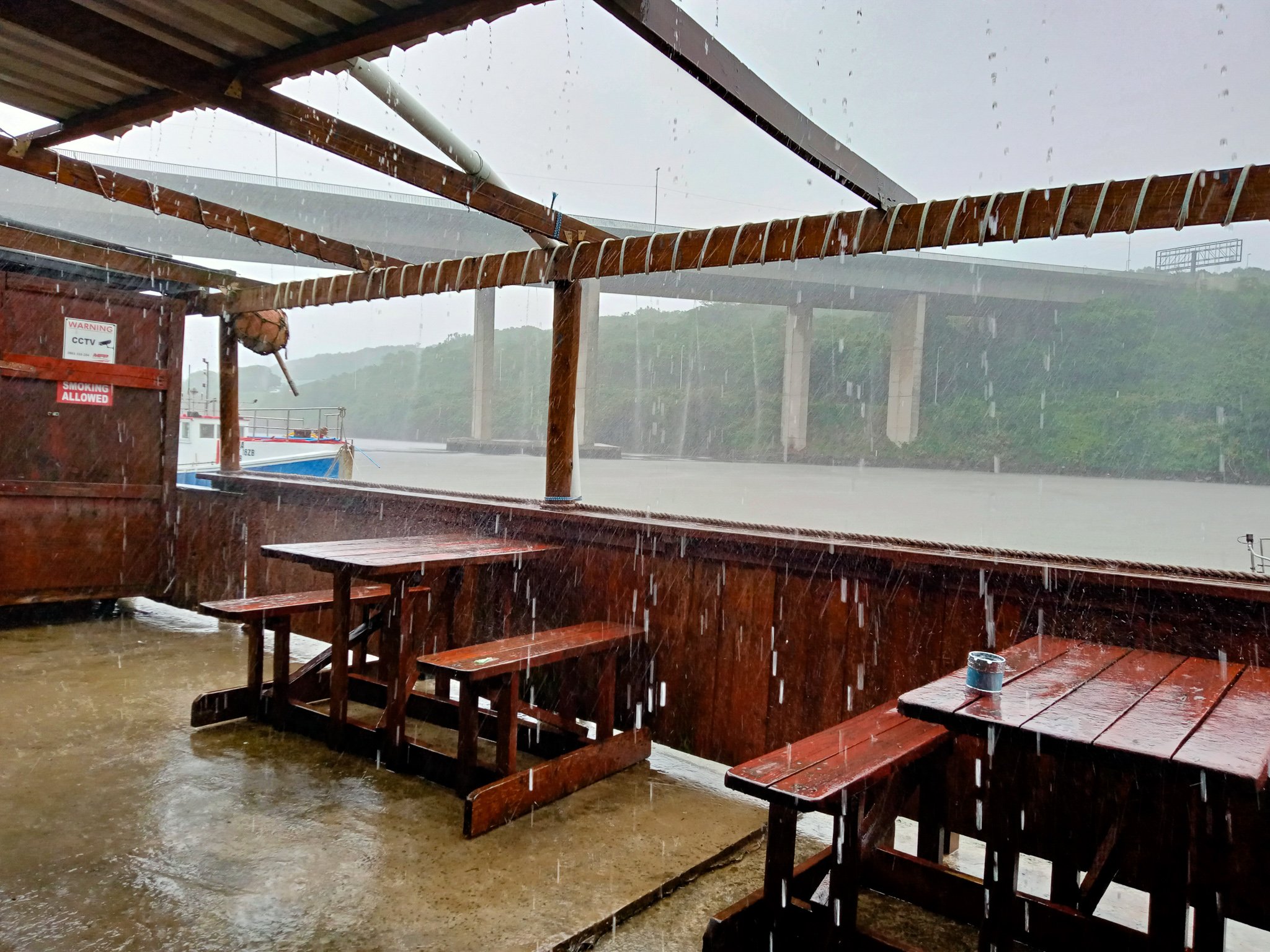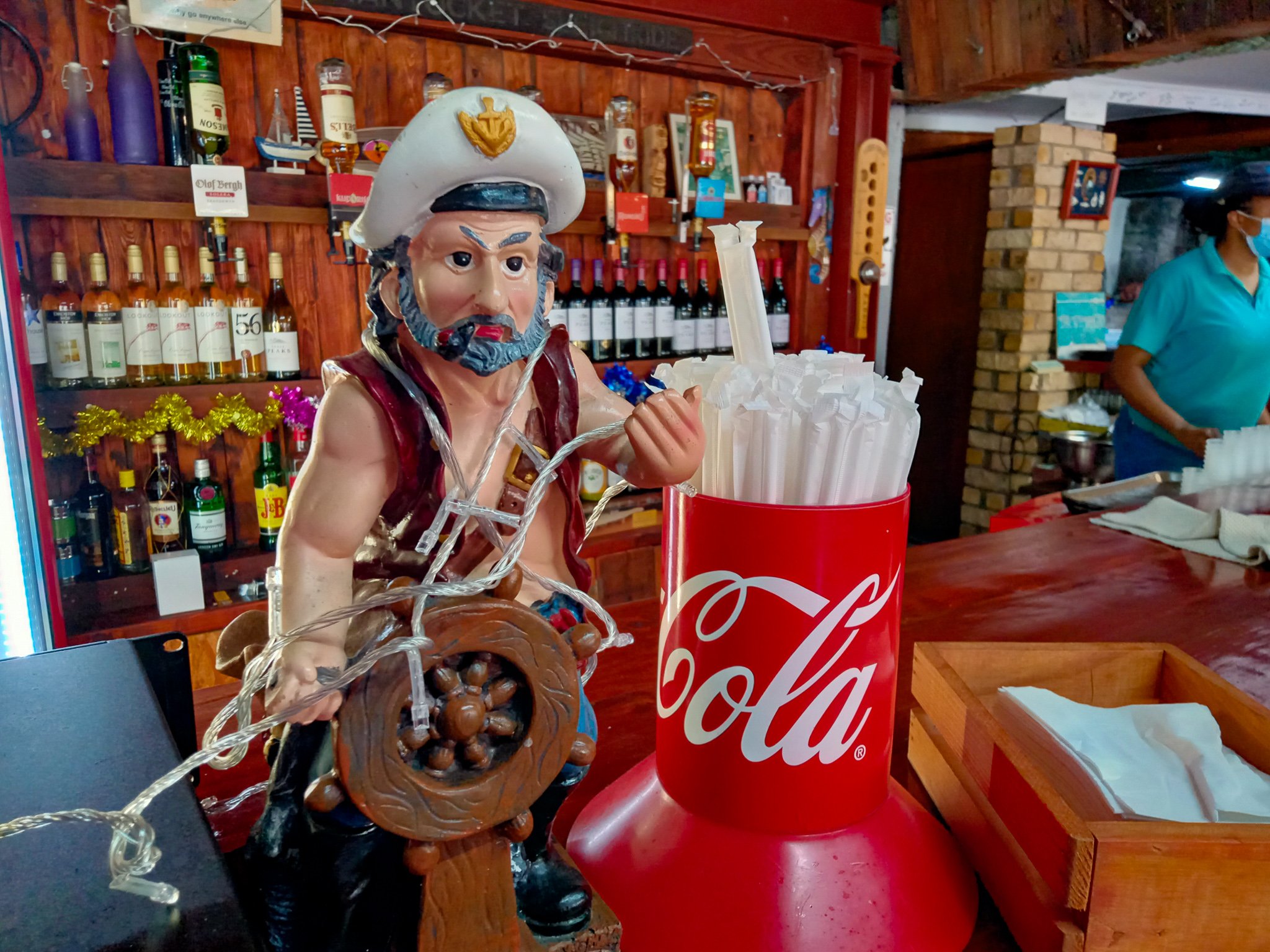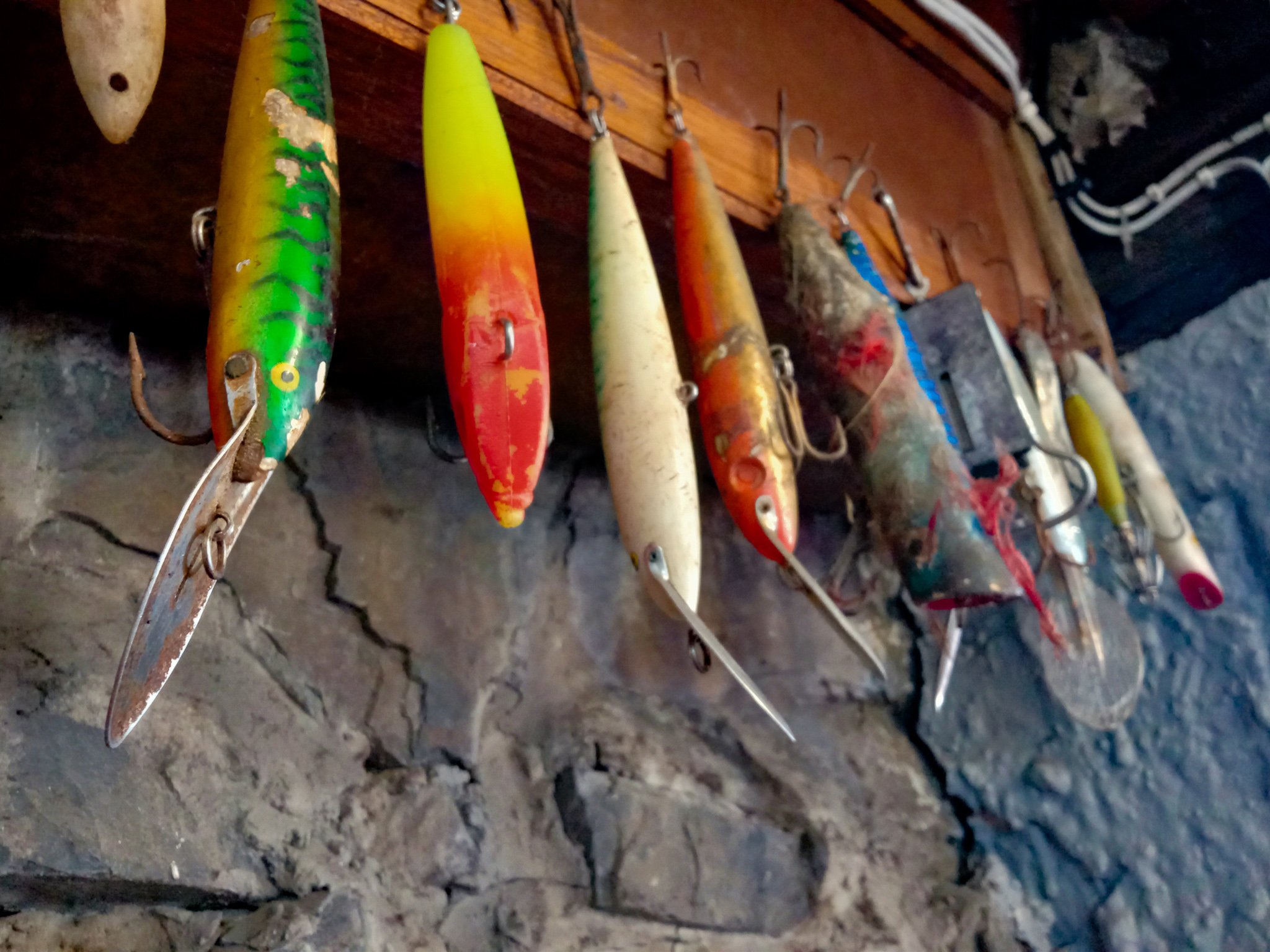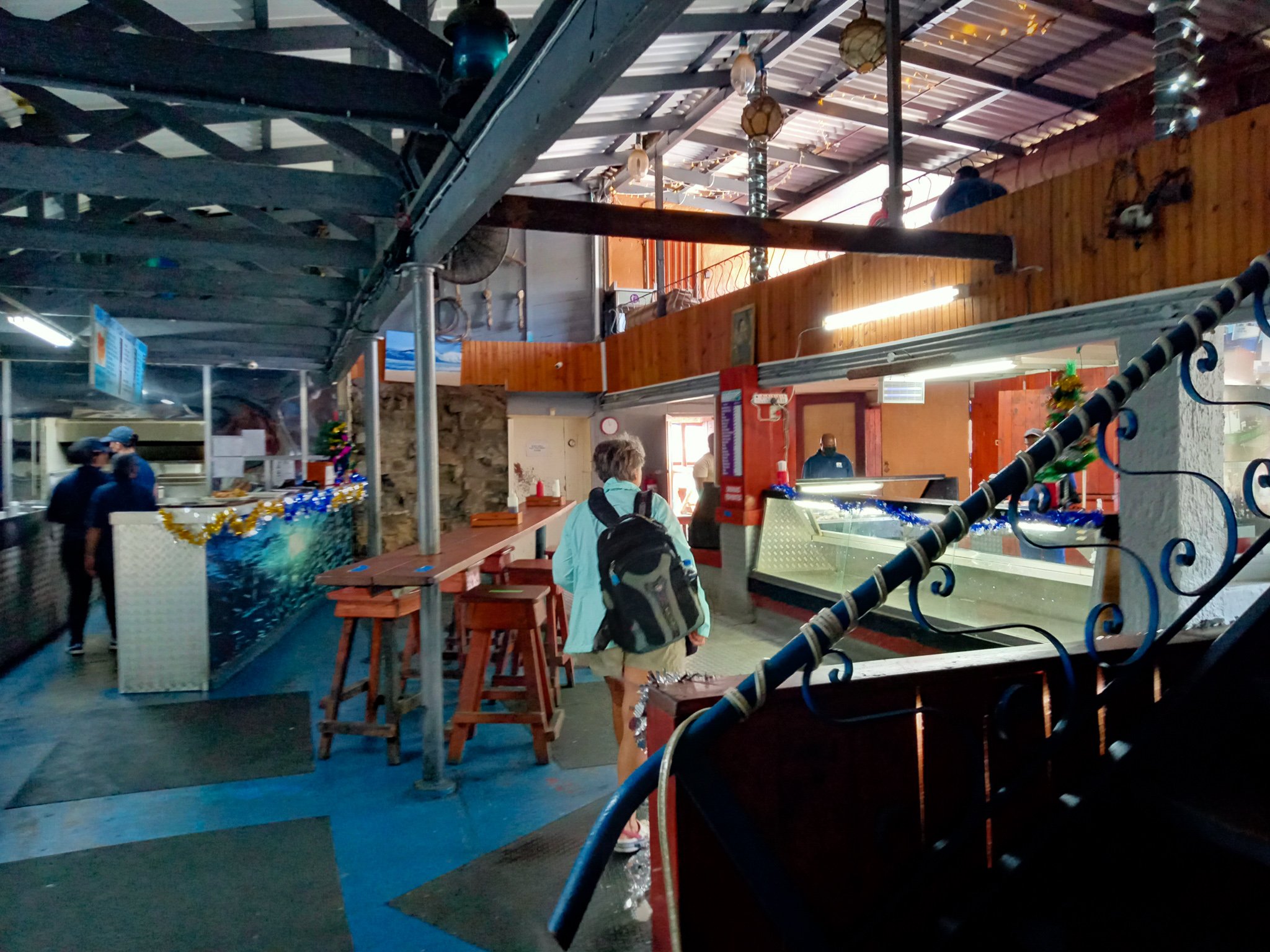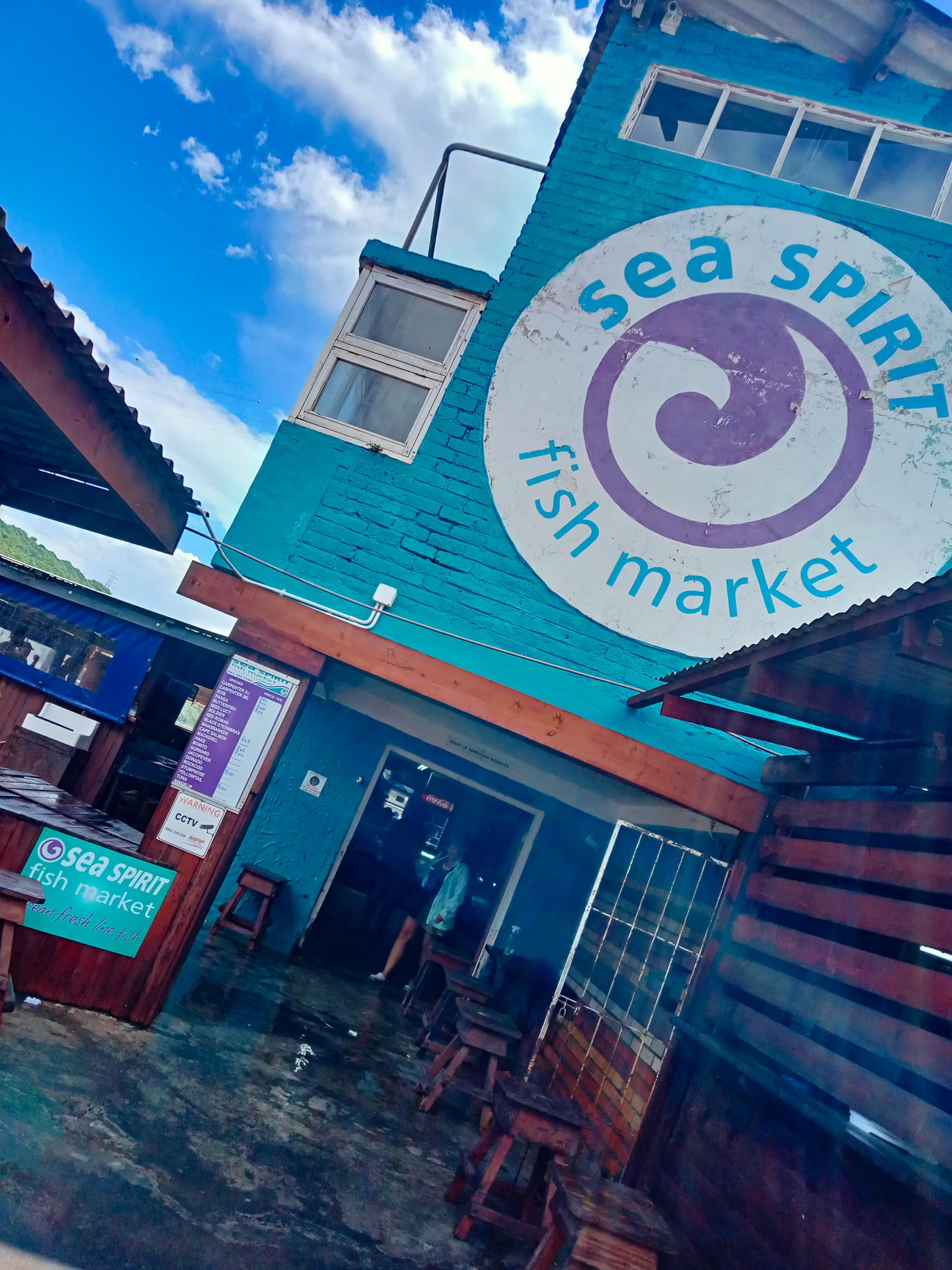The Richard’s Bay to East London route did not improve. The whole crew remained seasick, the weather grey and wet, the air fridgid with cold humidity, and gratefully, with the current speedy and the wind strong. Because, what we didn’t realize as we were rocking and rolling in all that weather: Sonrisa’s engine wasn’t feeling all that tiptop, either.
The morning of the third day, our wind died and we had sailed ourselves out of the current with the intention to sneak into East London to hide from another fierce storm heading our way from the South. It was only as Sonrisa slowed to a bob, that we decided to fire up the diesel and knock out the last ten miles or so. Yanmar the Magnificent II (name stolen from friends Vandy & Eric on Scoots with their own Yanmar the Magnificant) fired up, and he even ran, but every ten minutes or so, he would stutter and lose his oomph.
We could see the grey coastline in the distance, and despite the lack of wind, enormous swells were still chasing us toward land. 3-4 meters (9-12 feet) of water welled up and shoved Sonrisa here and there at their whims. While out in open ocean, and without breaking curls, this is no big deal. With an engine or wind to keep us moving steadily with our own momentum this is no big deal. But as we neared the narrow mouth of the port to East London, with a stuttering engine and not a single breath of wind, those waves were threatening to pick us up and shove us against the breakwater if Yanmar decided he’d had enough at just the wrong moment.
Helm in hand, I look at Andrew uneasy. “What should we do?”
Usually, we would just hove-to or anchor outside of port and wait until Andrew could fix whatever problem plagued Yanmar. But, with the storm nipping at our heels, we couldn’t easily stay out. The second strategy for managing engine unreliability would be to just sail in. But, this is the calm before the storm, apparently, and these strange waves had a glassy sheen to their inner curl. Last back up plan: be ready to drop the anchor. So, we send Andrew forward, harnessed on with his life vest and teather while I concentrate on keeping Sonrisa pointed in the right direction. I feather Yanmar’s throttle up and down based on his present mood, and squint into the misty rain that is still coating our eyelashes and eyebrows as we cross the precipice between open ocean and safe harbor.
Yanmar holds out.
He continues to hold out past the enormous shipping vessels pulled up to the wall for to load fleets of Mercedes Benz and BMWs manufactured in South Africa and destined for sale in the United States.
He continues to hold out while we lay our anchor in a river thick with mud runoff.
Usually, once our anchor is down, we can breathe a sigh of relief, but a Captain’s job is not done. If we need to move anchorage for any reason, we need that engine in working order. So, despite being on watch since 2:00 a.m., Andrew begins the unenviable task of tearing apart the dual racor fuel filters, the viewing port on the fuel tank and all the hoses from tank to engine to figure out where the blockage must be.
He knew right away what the problem was.
Back in Tanzania, the gasket squeezed between the fuel tank and the door to the tank’s fuel port had started to leak. While on passage down the Moz Channel, we could smell diesel anytime the waves kicked up and had us rocking around. It was leaking from the edges of this viewing port. We tried to get replacement gasket in a few other locations the year past, but they simply did not have the right material to solve the problem. Andrew tried to improve the seal with some caulk, but a diesel leak is tricky. Most adhesives you can buy are weakened by oil infiltration, and so his make-do strategies simply weren’t holding. In Richard’s Bay, he finally found replacement gasket. As he peeled the old gasket away, it crumbled in his hand.
“Ugh. Good thing we got to this before it ended up in the tank!” He had said, realizing that if this got sucked through the fuel intake hoses it would plug everything up.
Oh well....
He cleaned everything out and Yanmar was good as new.
Then, time for a nap.
We were scheduled to be in East London for only three days, maximum. Of course we could stay longer, but we had committed to making it to Cape Town before Christmas so that we could explore Cape Town with Steelies the week between Christmas and New Year, then at least be there to see them off if we were bailing out on them at this point. In addition, we were in a mood to get this coast behind us sooner rather than later. There are countless amazing places to explore on this coastline! But, our nerves about whether or not we could stand up to the tricks this stretch of ocean can pull, prevented us from relaxing and enjoying the place. We needed to get the Cape of Good Hope behind us, to know we’d survived the worst. “Direct as possible to Cape Town!” we had said on a video call with Pete and Jen just before we left Richard’s Bay.
East London, though, was non-negotiable, unless we wanted to try our hands at some serious storm sailing. Based on the cat’s recent revenge poo, we decided not to push our luck. Mark and Susan on S/V Erie Spirit and Matt, Jen, Conrad, and Mark on S/V Perry had caught the last few moorings at the yacht club along with us. Mark and Susan stopped by in their dinghy.
“Lunch at the fish market, anyone?”
We were grateful for the offer to drive us over, as Grin was all folded up and we are lazy. So, we hopped overboard and into the dink. The sun was breaking through clouds and diving back under again as we motored our way to the fish market. A big black cloud hung ominously over the train bridge that allegedly throws metal shards on everyone’s boats in the river below, leaving iron rust stains wherever they land. We had just made it to the wobbly dock when rain started pelting down. We rushed inside and watched as the rain doused everything around us and stole our view of Sonrisa from the restaurant windows.
The Fish Market had just the right ambiance that a fish market should. Old codgery fishermen with gum boots milled about while the snap and sizzle of fish filets fried in the deep frier along side “chips” or potato fries as we like to call them. Stacks of fresh looking whole fish laid on ice, Katherine Hepburn’s dream emporeaum. We enjoyed a fish and chips, and fried squid in Mark and Susan’s good company.
But the weather didn’t improve that afternoon and the French boat anchored next to us started riding it’s anchorage bicycle. As they slid closer to Sonrisa's hull, we picked up and moved further away. We stayed aboard to monitor the situation for the rest of the night.
Among other problems to solve: after Richard Henry Dana dumped our fresh water tank again on the last passage, we were feeling a bit shy of our water stores. We would make more water, but the muddy river was too muddy to ask our water maker to do that sort of task. Luckily, one crazy sailor vacated his corner slot in favor of heading out to sea in the leftovers of the stormy weather. So, we docked up and joined the yacht club for the evening.
As soon as we bring out the dock lines, Katherine Hepburn darts out to roll all over them with some kind of longing for the past and statement of her preference for dock living? I’m not sure.
The yacht club was yet another unassuming building with brick laid cooking spaces for the braai. Stacks of wood gathered from a yacht club member’s trees felled on their farm promises to keep the crew here in braai wood for at least another year to come. A little bar slings some bubbly and cold grog or a rummy cocktail if that is your thing. All that a sailor really needs. A deck overlooks the sailboats docked and moored in long rows.
Here, we meet up with our old friends on S/V Perry & Erie Spirit. A few locals join our group, celebrating the purchase of a new-to-them catamaran they hope will someday take them around the world. We cook our dinners, debrief our horrible passage, and learn that it wasn’t just the Oddgodfreys who sailed through a bit of misery. Everyone aboard Perry ended up offering their dinners to Neptune as well.
“Now, this is solid braai-time conversation,” Andrew complains. “We’re going to scare off the new sailors.”
“No!” I say, “if you can sail this coast, you can sail almost anywhere!”
The South Africans were pleased to hear this, undoubtedly having enjoyed a mile or two on their wild coast.
A terrible photo, but it gives you a sense of the energy in the room.
…………
…………
……….
“...and then I said NO its not! Pelicans do NOT fly!” Matt is regaling Andrew with a story as I climb up and over the picnic bench and slide in with a refilled glass of wine. “ ….and then they said, ‘of course Pelicans fly, THIS is a PELICAN!’”
Matt’s wife Jen is laughing, Andrew is laughing, Susan is laughing, and I am missing out.
“Start over!” I command.
“Oh...I’m just relaying the fact that Trance now thinks I’m the crazy guy on the dock.”
I nod. “Someone’s gotta be that guy, may as well be you.”
“We got into a heated argument over a photo she was showing me of a pelican on their last passage.”
“You think Pelicans can’t fly?” I ask, trying to piece together the start of the conversation.
Matt scrunches up his face. “Nooo....of course I know they can fly! It was one of those situations where she would say Pelican, but I kept hearing “PENGUIN”. And I kept thinking, “That’s not a Penguin, Penguins can’t fly!” but even I was saying Pelican.”
Trance is the name of a boat carrying an American husband and wife team, Dan and Marlene. As is natural for all sailors, we don't refer to each other by our actual names. We refer to each other by our boat names. This has happened since the dawn of sailing time. Read old sailing books, and the authors will refer to the crew of ships by the name of their ships. Half the time, we have sailed with friends across entire oceans and we still don’t know each other’s real names, just the names of our ships. Andrew and I are interchangeably referred to as “The Sonrisas” or more often “The Oddgodfreys”. But that is not because anyone knows our last name is “Godfrey”. A blog can sometimes takes higher priority than a ship, apparently. Sonrisa is an Oddgodfrey as well.
I digress...
Matt continued, “Her husband was trying to hush her saying ‘Marlene, you can’t argue with a crazy person. It’s okay.’ and I was like No! That. Is. Not. A. PELICAN!”
Matt’s wife Jen was just shaking her head. The rest of us were losing our minds with laugher.
"Did you eventually figure it out?" I gasped between rounds of uncontrollable chortaling.
“Well, yeah, but not until the middle of the night when I sat up in bed and realized “she was saying 'pelican’, I was saying ‘pelican,’ but I was thinking of a 'penguin'."
This leads all of us into another round of hooting laugher. We all know a crazy sailor or two, to whom you just can’t speak any sense and from whom you must sidle off to find another conversation. But what if you were that crazy sailor? What if you could see people sidling off whispering that the grog had finally taken you clear away.
Come to think of it, this may have happened to me before.
I think this happens to me with land people now-a-days.
That is okay. And I was grateful to Matt for sharing this story with us. A night like this with fellow sailors is just the sort of thing a sailor needs to recover from a miserable passage. We climbed into our bunk with our bellies full of tasty braai-dinner, our sailor hearts full of laugher, and our moods sufficiently lightened that it no longer seemed insurmountable to cast off again the very next day with this group of sailors forming our armada.


